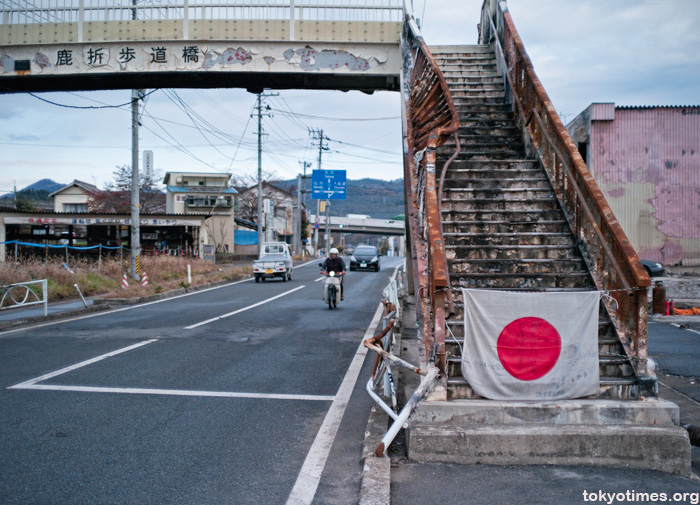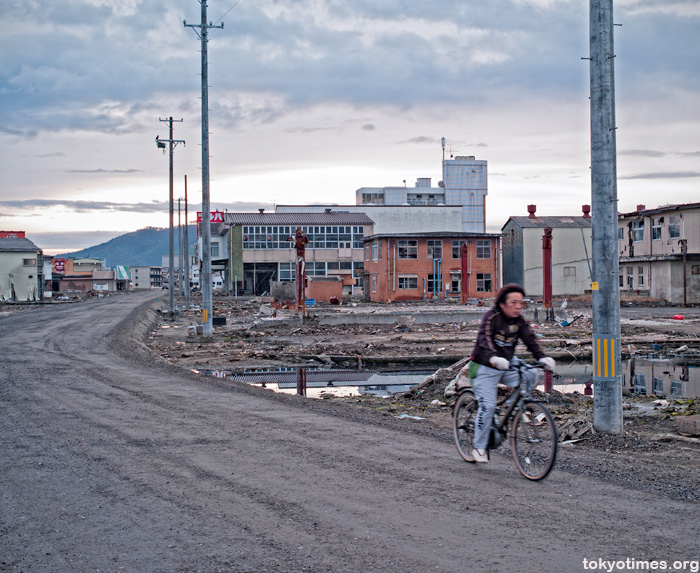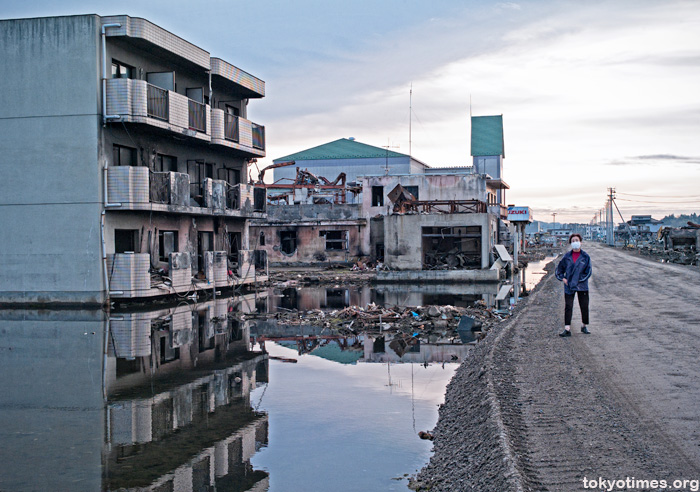It is hard to believe that a year has already passed since the earth moved, the sea turned into a monster and a large corporation’s negligence all combined to quite literally shake Japan to its foundations.

But a year is a long time, and a visit to the devastated region several months ago, along with recent coverage of the affected areas, prove that the clean-up is well underway, with an enormous amount of debris now cleared.

The process of rebuilding, however, is a very different matter indeed, and there’s genuine doubt as to whether some towns will ever return to life again — even more so those in the exclusion zone. A large area that will sadly not see human habitation again during the lives of many of its former residents.
Yet for someone living in Tokyo, simply trying to imagine getting over the horrors of the earthquake and tsunami is difficult, but coupled with the ongoing uncertainties of radiation, it’s a life that is utterly impossible to grasp. The effects of which, both physical and psychological, many thousands of people will have to somehow deal with for decades to come.
A disaster that, unlike the forces the earth unleashed, could clearly have been averted. Cutting corners when building a convenience store or reforming a property is often all well and good, but the arrogance/greed/incompetence (delete where applicable) of doing the same thing with an ageing nuclear power plant is beyond reprehensible. The shadowy truth of which, along with everything that actually happened, will hopefully one day rise to the murky surface.
But just like in these few, awkward paragraphs, the ongoing saga of Fukushima Daiichi now often dominates the story of March 11, and in doing so is in danger of ignoring the continued suffering of those directly caught up in the events of that fateful day 12 months ago. A massive number of people who, from personal experience and TV footage, deserve far more respect — both for what they’ve been through, and how they have dealt with it. As one way or another, with or without assistance, life has to go on.

Linette says
Love the post. The events of last year are so much on our minds right now. Thank you.
Lee says
Thanks a lot Linette.
winnie says
Thank you for sharing this post! Love it too!!
Yes, Live in Tokyo or even further than that can only imagine how the life going in affected area.
I can still remember that some of people can say “How? How? will the radiation come to Tokyo? Or yucky! you dare to drink water from the Tap? Sometimes, I quite flared up and told them what about the affected area? Living in Tokyo is already fortunate enough! And Yes, I also only can imagine how the life there so I cannot said much.
Sorry I think I am off topic !
Lee says
Cheers Winnie.
Yes, I went through similar feelings, especially so when the crisis was unfolding and an awful lot of misinformation was being spread about.
I’ve seen documentaries and read about how the worries about radiation affected those people near the Chernobyl plant. Hopefully the Japanese authorities will learn from that and give people all the help they need. Can’t say I’m confident they will though…
Roy says
Just the other day I was watching some NHK World shorts about this topic and how people are moving forward. There’s this one about a shimimochi business owner moving from Fukushima and reestablishing elsewhere, and there’s this other one about some mall owner and their workers wanting to reunite the community of their devastated town. What really touched me though was about this one man, who lost his little son and daughter, and his father in the tsunami. He had to stay in shelters with his wife and his mother but day after day he searched for the bodies of his kids and his dad, and only found his daughter’s and his father’s. He’d find picture albums of his neighbors and pass it on to them, but he hardly saw some of his. Even after many many months after, he kept on going back every morning before work to the spot where his own house used to be to greet his son.
It’s things like this that make me realize that even though I think feel that I sympathize for their massive losses, I’ll never be able to fully relate to it for I wasn’t there when it happened.
Lee says
Yes, as much as we sympathise with those affected, we can never even begin to understand what they went through. I spent some time talking to a young fella who had lost his father and several friends. He was remarkably composed when he told me, but it was clear that not only what he went through, but what he’d seen, was constantly with him. Time is obviously a great healer, but one can only imagine how much time will be needed. If indeed there is enough of it available.
Hans ter Horst says
Excellent article Lee! I feel bad for the people of Northern Honshu as their troubles are indeed completely overshadowed by the Fukushima disaster that could have been easily prevented if the politicians, bureaucrats and semi-public companies like Tepco had not been in collusion with each other. The Reuters article, I think you tweeted the other day, was very instructive, but I cannot understand why there is so little protest other than that great punk song by SCRAP.
Lee says
Thanks! And for the SCRAP mention. Somehow they had completely passed my by. Total respect to them.
I totally agree. All the anger seems to have been channeled into the argument against nuclear power. An issue obviously worthy of debate, but none of the problems would have happened if it wasn’t for the gross negligence of Tepco. But why there haven’t been demonstrations in the street (at the very least) against the company I don’t know. And it’s even more unfathomable when one considers Tepco’s attempts to cover things up and their mistreatment of workers.
Jake from Debt Sucks says
One thing that’s really stuck with me is the fact that it was televised. I can’t really say much about where I was during 9/11 (I was in school), but as for the Great Tohoku Earthquake, I was frantically flipping through live feeds on my computer on the other side of the world, only to watch live as the tsunami rolled inland while people tried to drive their cars out of it’s path.
This quote from the linked article really caught my eye, too:
“My hometown is my hometown, but it is not a place to live anymore”
Lee says
Yeah, it’s extremely sad, and a scenario that’s going to be played out all along the coast.
I got home not long after the quake and remember turning the TV and seeing those black waves engulfing the land. Horrendous scenes that were shown without and histrionics from TV presenters, just shocked silence at what we were all witnessing…
Matt says
Great post and some nice shots. I was in Tokyo when the event happened, having landed only an hour before it struck. It was certainly a worrying time to be there and that was 200km from the situation, so I can not even begin to understand how those closer must have felt then and now.
I guess the focus on Fukushima Daiichi is completely understandable, given how close they came to absolute distaster for massive areas of Japan and possible many other countries. Having said that I’m diminishing the disaster that actually did befall so many.
Lee says
Cheers Matt. Yes, it was a very strange time, especially with so much information and misinformation flying about. Something that sadly hasn’t really changed…
That’s very true. It can’t be ignored. And even trying to downplay it would be wrong. Yet at the same time it undoubtedly takes coverage away from the other, natural disaster.
Jeffrey says
“The process of rebuilding, however, is a very different matter indeed, and there’s genuine doubt as to whether some towns will ever return to life again . . .”
And it seems that many of the towns that are rebuilding are, lacking any guidance or real assistance from the central government, simply rebuilding the old towns as best as possible. No one knows when this will happen again, but it will as it happened in almost the same manner less than 100 years ago. But it’s folly to not move as much of these port and river delta cities to higher ground or farther inland.
Lee says
Yes, history repeating itself — again.
Rebuilding a town in a different location in many ways doesn’t make it the same town anymore. I understand that. But not taking into acoount what happened, which, like you say, will happen again at some point, seems like a horribly unnecessary risk to take. Plus after the events of March 11, can any of these places ever be the same again anyway?